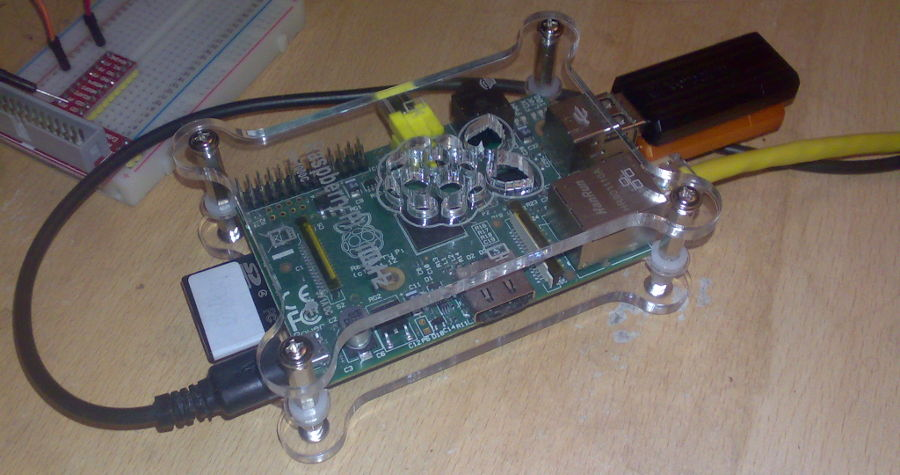USB RAID Speeds On The Raspberry Pi

Using a Raspberry Pi seems to make a lot of sense if you're in the market for a small NAS server, it's low cost, low profile, low energy etc...
Is It Up To It?
The only possible problem is the storage the only way to attach any real storage to a Pi is via USB. USB 2.0 has a maximum theoretical throughput of 480Mbits/s with but I don't think you'll ever get anywhere near that speed.
We only really need to achieve around 10MB/s as then the ethernet connection becomes the bottleneck
Benchmarking
I wanted to see what kind of throughput I could actually get with USB devices connected to a Pi so I wrote a device benchmarker tool that is able to measure both the read and write speeds of one or more block devices.
The Setup
I setup my Raspberry Pi B in the following way:
- Clean install of Raspbian 2015-02-16
- Ran apt-get upgrade on 00:00 10/04/15
- 2x Verbatim 4GB memory sticks
ID 18a5:0302 Verbatim, Ltd Flash Drive
The HDDs
Ok memory sticks aren't HDDs but they are what I had to hand at the time.
I formatted both the memory sticks to ext4 using gparted and ran my device benchmarker on each of them individually then both in parallel.
The Results
I ran both dd-read and dd-write tests 10 times and then took an average:
| Device | Reading (MB/s) | Writing (MB/s) |
|---|---|---|
| /dev/sda1 | 14.98 | 5.23 |
| /dev/sdb1 | 14.04 | 5.25 |
| /dev/sd* | 12.86 | 5.05 |
The results for the combined /dev/sd* are the speeds of the individual devices when tested at the same time.
The write speeds seemed a little slow to me, I knew they were going to be slower than the read speed but 3x slower? After a quick Google I stumbled upon http://usbspeed.nirsoft.net, it's basically a crowd-sourced database of USB memory stick read write speeds. I looked up the entries they had for my USB drive and took an average, they pretty much matched up so it seems that's what they capable of.
What Next?
Interestingly when both devices were written to/read from in parallel the speed seemed to only drop a little meaning the USB bus wasn't being saturated, the drives are the bottleneck. Could we boost the read/write speeds if we were able to treat both devices as a single device, in RAID0 for example?
I realise going after a higher read speed is a little pointless as at 14MB/s we would be saturating the ethernet connection which is only capable of an absolute maximum of 10MB/s but there is room for a 2x increase in the write speeds.
RAID
I'm going to use MDADM to setup a RAID0 array and then run the benchmarks again to see if we can achieve a write speed of >10MB/s
MDADM Array Setup
Installing MDADM was as simple and painless as:
sudo apt-get install mdadm
Once MDADM was installed I assembled a new RAID0 array from both my drives and formatted the array to ext4, the same
filesystem as before:
# Create the array sudo mdadm --create --verbose /dev/md0 --level=stripe --raid-devices=2 /dev/sda1 /dev/sdb1 # Format the new array as ext4 sudo mkfs -t ext4 /dev/md0
Benchmarking
I re-ran exactly the same benchmarks as before and got the following results:
| Device | Reading (MB/s) | Writing (MB/s) |
|---|---|---|
| /dev/md0 | 27.92 | 8.92 |
That's ~192% the read speed and ~170% the read speed. More importantly the write speed is nearing the 10MB/s maximum the Pis ethernet controller can handle!
MOAR SPEED!!
The memory sticks I was using definitely aren't the fastest out there and given the realistic through put of USB 2.0, which according to wiki is around 35MB/s, there's definitely still a lot of room for improvement.
But what about that 10MB/s limit of ethernet? Gigabit of course! I'm not the first to try this, see this article for example, I have a Raspberry Pi 2 so maybe I'll try hooking to a USB Gigabit adapter and add 2 or 3 faster USB drives and see if I can max out the USB bus.